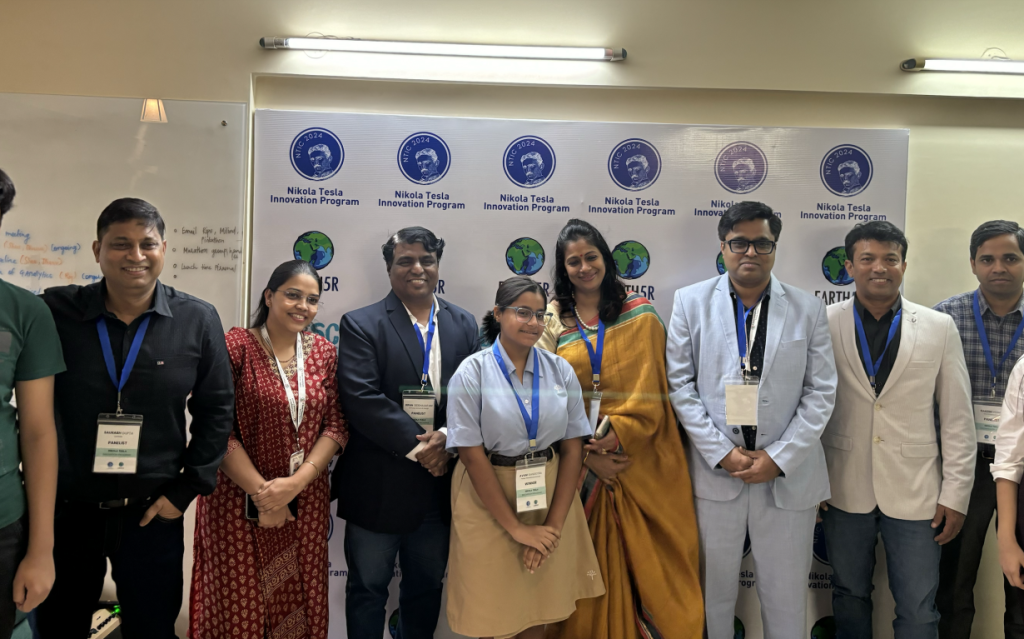Nikola Tesla Innovation Program

Nikola Tesla Innovation Program – January 2024
On January 30th, 2024, Earth5R’s Mumbai office was transformed into a hub of sustainable innovation as it welcomed the inaugural roundtable of the Nikola Tesla Innovation Program. The event’s pulse was innovations resonating with Earth5R’s commitment to sustainability and education.
The panel boasted a blend of expertise and experience, featuring Mr. Milind Rane from E4fresurrect, Mr. Mohammed Imran Khan from Geosphere, the design wisdom of Dr. Irfan Siddavatam from Somaiya College of Design, the visionary Mr. Saurabh Gupta founder of Earth5R, Mr. Rakesh Verma’s industrial insights from Tata Chemicals, and the academic perspective from Shamila Shetty, the education coordinator of Podar International School. They were joined by students from various colleges and schools, including the bright minds who won the Nikola Tesla Innovation Contest, all came together to tell a story of change and advancement.
The roundtable opened with a vibrant dialogue, where panelists divulged the intricacies of building successful large-scale waste management operations. They shared not just successes but also the obstacles they encountered, framing a narrative of resilience and ingenuity. It was a tale of starting from scratch and reaching peaks of circular economic success, demonstrating profitability while adhering to sustainable practices.
In line with Earth5R’s commitment to sustainability, Milind Rane discussed the motivation behind entering sustainable fashion, highlighting the significant textile waste issue and the emergence of fast fashion trends. He introduced the concept of “Resurrect,” giving pre-loved clothes a new life by buying, selling, and reforming them. The company compensates sellers and promotes sustainable consumption practices, particularly in non-metropolitan areas. They also collaborate with the Indian Post for transportation, aiming for holistic empowerment.
Imran added depth to the discussion by highlighting challenges in waste management, including transportation issues and materials that cannot be recycled and require costly incineration. He emphasized the need for government support to overcome these obstacles and make revenue generation more feasible.
Students, the innovators of tomorrow, seized this opportunity to quench their curiosity. They asked pointed questions, seeking to understand the path from ideation to implementation. The panelists, in turn, probed the students, tapping into the community’s pulse and assessing the end-user’s perspective to refine their offerings.
As the session progressed, the winners of the Nikola Tesla Innovation Program showcased their prototypes, receiving invaluable feedback from the panelists. This interaction was more than a mere exchange of ideas; it was mentorship in action, guiding the next steps to scalability and impact.
Himanshi Jain, a third-year Product Design student from Somaiya School of Design, took first place. Avani Gandotra, a 10th-grade student at Podar International School, came in second, and Zohan Shaikh, a 9th-grade student from Podar International School, secured third place.
Himanshi Jain’s winning concept introduced a paradigm shift in furniture construction with her innovative lounge chair. Crafted from eco-friendly cardboard and designed to use natural glue, it redefines sustainability in design. By ingeniously repurposing leftover materials into functional side tables and fostering community collaboration for lamp prototypes, it embodies a holistic approach to waste reduction. Not only is it comfortable and stylish, but it also challenges conventional notions of sustainable furniture design, offering a forward-thinking solution for a greener world.
Avani Gandotra’s idea focuses on creating eco-friendly cushion covers by repurposing old plastic bags and clothes. Cut a square cloth, such as an old bed sheet or T-shirt, and add frills to the edges. Knot three sides, fill with plastic, and seal with knots. This sustainable solution not only saves money but also reduces waste.
Zohan’s SmartSports concept revolutionizes sports training with AI, offering personalized tips and live tournament streaming. It prioritizes eco-friendly practices and will be available for free to users, with revenue generated from sponsorships and partnerships. Combining technology and athleticism, SmartSports champions both performance and sustainability.
True to Earth5R’s ethos, the event didn’t just talk about sustainability; it embodied it. The refreshments were a testament to this—a zero-waste spread with vegetarian snacks on biodegradable corn-based dishes, reflecting the core values of the organization.
Saurabh Gupta addressed broader questions about population and resource distribution, underlining the disparity in resource consumption globally. Panelists collectively stressed the importance of combating climate change through sustainable lifestyles and behavioral changes, drawing inspiration from past generations’ practices and urging youth engagement in the movement.
The conclusion of the session was marked by vibrant networking, an exchange of contacts, and shared ambitions. The offer from panelists for site visits underscored a commitment to practical learning and ongoing support, bridging the gap between theory and practice.
This event wasn’t just a roundtable; it was a launchpad for sustainable innovation, inspiring participants to become an integral part of the Earth5R ecosystem and advocate for change.
As we publish this account, we invite our readers to engage with Earth5R’s sustainability courses, designed for both students and professionals. Let’s join hands in creating a future where education, innovation, and action coalesce to preserve our planet.
Join the movement. Embrace sustainability. Transform with Earth5R
